牛津上海版英语九年级上册课件:Module3 Unit 7 Escaping from kidnappers Speaking(共19张PPT)
文档属性
| 名称 | 牛津上海版英语九年级上册课件:Module3 Unit 7 Escaping from kidnappers Speaking(共19张PPT) |

|
|
| 格式 | zip | ||
| 文件大小 | 11.7MB | ||
| 资源类型 | 教案 | ||
| 版本资源 | 牛津上海版(试用本) | ||
| 科目 | 英语 | ||
| 更新时间 | 2016-06-18 22:53:22 | ||
图片预览

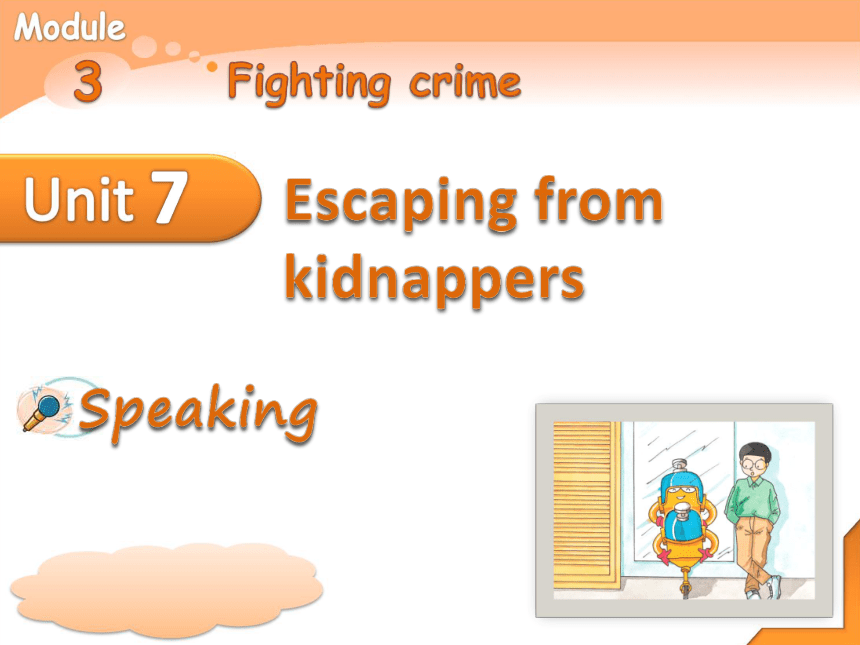
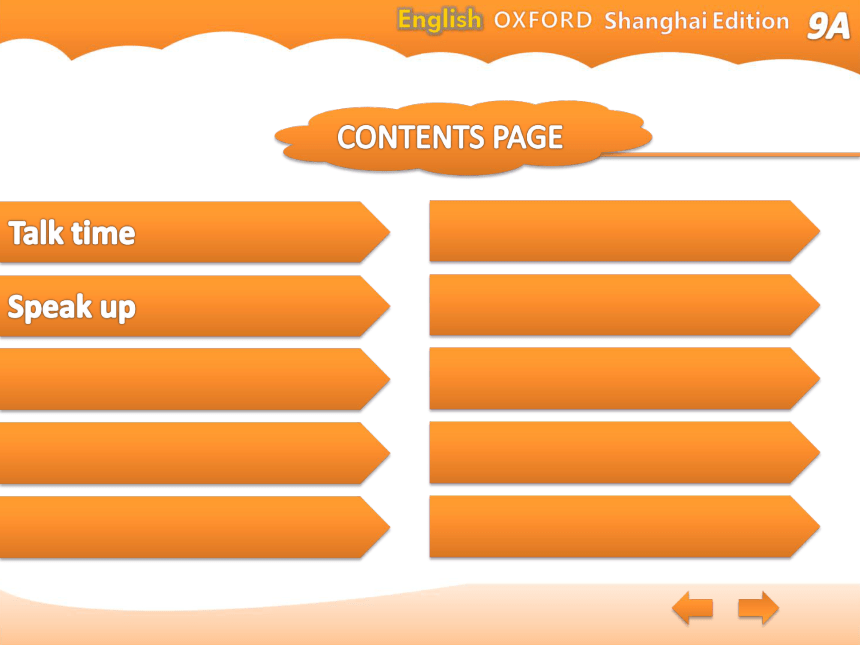
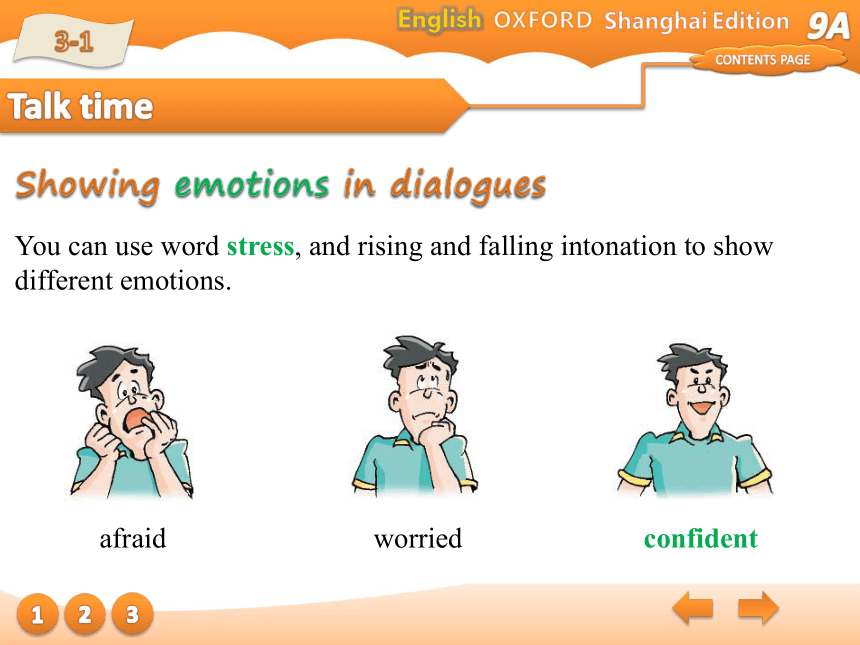

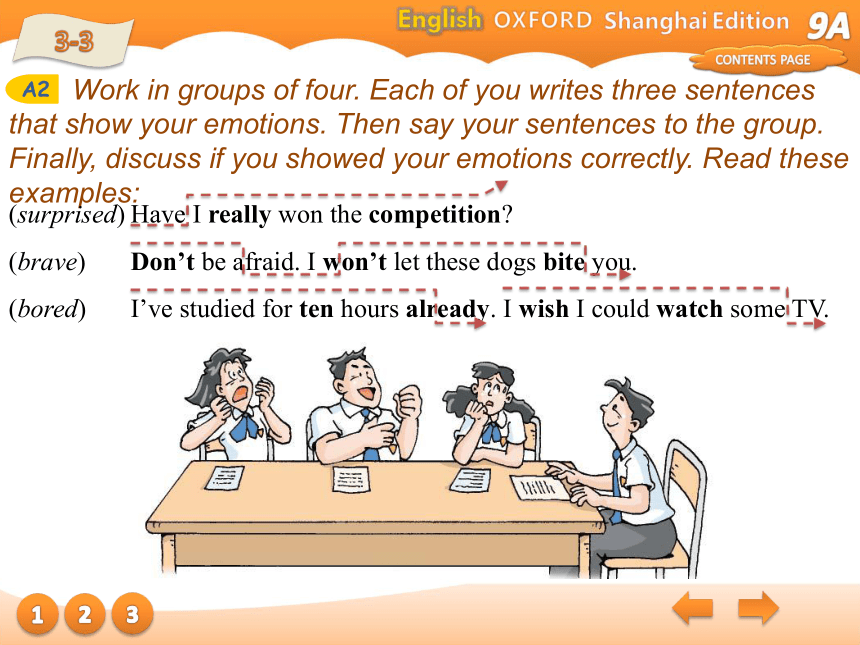
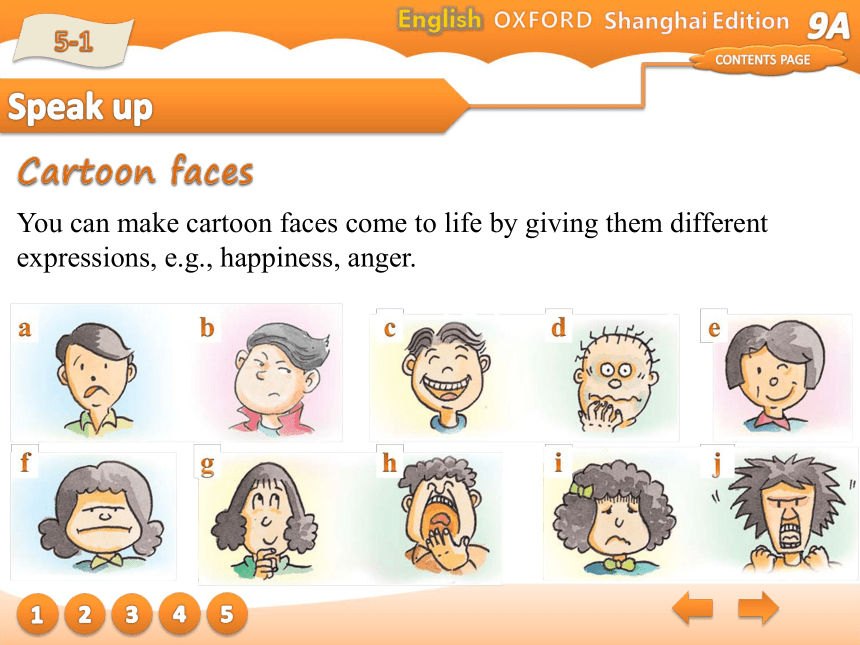
文档简介
课件19张PPT。Speaking3Fighting crime7Escaping from
kidnappersCONTENTS PAGETalk timeSpeak upTalk time3-1123Showing emotions in dialoguesYou can use word stress, and rising and falling intonation to show different emotions.afraidworriedconfident With a partner, practise using these emotions to say the sentences in the box. You must decide which of these emotions goes with each of the sentences.A13-2123 Work in groups of four. Each of you writes three sentences that show your emotions. Then say your sentences to the group. Finally, discuss if you showed your emotions correctly. Read these examples:A23-3123(surprised) Have I really won the competition?
(brave) Don’t be afraid. I won’t let these dogs bite you.
(bored) I’ve studied for ten hours already. I wish I could watch some TV.Speak up5-1123Cartoon faces4You can make cartoon faces come to life by giving them different expressions, e.g., happiness, anger.5 Work in pairs or small groups. Look at the description and the cartoon faces. Then discuss which description goes with which face.B15-21234Very happy. You can make the person burst out laughing by opening the mouth and showing the teeth.
Frightened. Face is pale. Hair stands on end. Eyes are wide open.
Naughty. Mouth goes up on side where eye is closed.cde5Tricky. Eyes look to the side and mouth is small.
Very angry. Mouth is wide open in a loud shout.
Thoughtful. Eyes look up and to the side.
Sad. Mouth and eyebrows droop.
Angry. Use straight lines for the mouth and eyebrows.
Sleepy. Nose is pushed up to eyes, which are closed. Mouth is wide open showing teeth.
Bored. A wavy line for the mouth and droopy eyes give a bored look.5-31234bjgafhi5 Work in groups of four or five. Decide on the plot for the end of the story about The Test-tube Affair (e.g., What happens to Terry and the kidnappers? Does Terry meet his father again?) You can invent your own ending.*B25-412345 Then some of the groups can tell the class their stories. Each person in the group must take the role of one of the characters in your story. Tell the story from your point of view.*B35-51234Example:
I am Terry. I escaped from the kidnappers. I went up on the roof. Then I saw a helicopter. …
I am one of the kidnappers. Terry fooled us. We heard a big noise. We ran into the room. We fell over a rope. Then I got up and ran after Terry. …The class can ask you questions about what happened.5说 明
本册教材根据上海市中小学(幼儿园)课程改革委员会制订的课程方案和《上海市中小学英语课程标准(征求意见稿)》编写,供九年义务教育九年级第一学期试用。
本教材经上海市中小学教材审查委员会审查准予试用。
《英语(牛津上海版)》(试用本)
主 编:沃振华
原 作 者:P Etherton G McArthur P Leetch
改编人员:沃振华 朱维庭 李绍贤 施安吉 施志红
奚翠华 卢 璐 张 瑶
牛津大学出版社(中国)有限公司英语教材编写委员会
责任编辑:马芳芳 林 妍
插 图:K Y Chan 周允达
课件制作:卢 璐
支持学校:上海市市北初级中学emotion/?'m???n/ n.a strong feeling, for example love or angerHis voice is filled with emotion.stress/stres/ n.saying one word or part of a word more strongly than anotherIn the word ‘dictionary’, the stress is on the first syllable of the word.confident/'k?nf?d?nt/ adj.sure that you can do something well, or that something will happenI’m confident that our team will win.recently/'ri:sntl?/ adv.not long agoShe’s been on holiday recently – that’s why she’s so brown.burst/b?:st/ v.come from somewhere suddenlyHe burst into the room without knocking.burst out (doing)start doing something suddenlyHe looked so silly that I burst out laughing.pale/pe?l/ adj.with not much colour in your face; whiteAre you ill? You look pale.
(brave) Don’t be afraid. I won’t let these dogs bite you.
(bored) I’ve studied for ten hours already. I wish I could watch some TV.Speak up5-1123Cartoon faces4You can make cartoon faces come to life by giving them different expressions, e.g., happiness, anger.5 Work in pairs or small groups. Look at the description and the cartoon faces. Then discuss which description goes with which face.B15-21234Very happy. You can make the person burst out laughing by opening the mouth and showing the teeth.
Frightened. Face is pale. Hair stands on end. Eyes are wide open.
Naughty. Mouth goes up on side where eye is closed.cde5Tricky. Eyes look to the side and mouth is small.
Very angry. Mouth is wide open in a loud shout.
Thoughtful. Eyes look up and to the side.
Sad. Mouth and eyebrows droop.
Angry. Use straight lines for the mouth and eyebrows.
Sleepy. Nose is pushed up to eyes, which are closed. Mouth is wide open showing teeth.
Bored. A wavy line for the mouth and droopy eyes give a bored look.5-31234bjgafhi5 Work in groups of four or five. Decide on the plot for the end of the story about The Test-tube Affair (e.g., What happens to Terry and the kidnappers? Does Terry meet his father again?) You can invent your own ending.*B25-412345 Then some of the groups can tell the class their stories. Each person in the group must take the role of one of the characters in your story. Tell the story from your point of view.*B35-51234Example:
I am Terry. I escaped from the kidnappers. I went up on the roof. Then I saw a helicopter. …
I am one of the kidnappers. Terry fooled us. We heard a big noise. We ran into the room. We fell over a rope. Then I got up and ran after Terry. …The class can ask you questions about what happened.5说 明
本册教材根据上海市中小学(幼儿园)课程改革委员会制订的课程方案和《上海市中小学英语课程标准(征求意见稿)》编写,供九年义务教育九年级第一学期试用。
本教材经上海市中小学教材审查委员会审查准予试用。
《英语(牛津上海版)》(试用本)
主 编:沃振华
原 作 者:P Etherton G McArthur P Leetch
改编人员:沃振华 朱维庭 李绍贤 施安吉 施志红
奚翠华 卢 璐 张 瑶
牛津大学出版社(中国)有限公司英语教材编写委员会
责任编辑:马芳芳 林 妍
插 图:K Y Chan 周允达
课件制作:卢 璐
支持学校:上海市市北初级中学emotion/?'m???n/ n.a strong feeling, for example love or angerHis voice is filled with emotion.stress/stres/ n.saying one word or part of a word more strongly than anotherIn the word ‘dictionary’, the stress is on the first syllable of the word.confident/'k?nf?d?nt/ adj.sure that you can do something well, or that something will happenI’m confident that our team will win.recently/'ri:sntl?/ adv.not long agoShe’s been on holiday recently – that’s why she’s so brown.burst/b?:st/ v.come from somewhere suddenlyHe burst into the room without knocking.burst out (doing)start doing something suddenlyHe looked so silly that I burst out laughing.pale/pe?l/ adj.with not much colour in your face; whiteAre you ill? You look pale.
